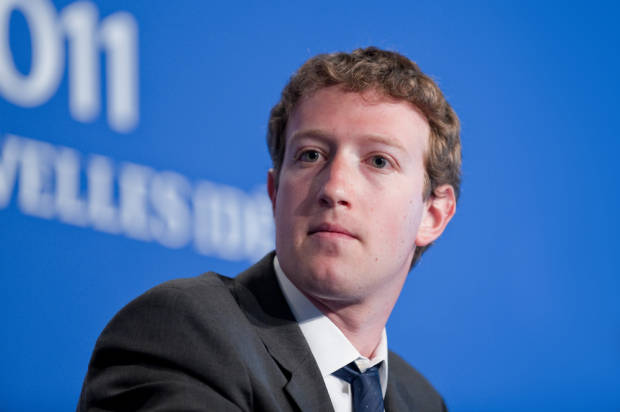Ahead of Mark Zuckerberg’s Senate hearing on Tuesday, a global advocacy group, Avaaz, took an army of 100 life-sized Zuckerberg cutouts wearing ‘Fix Facebook’ t-shirts to the Capitol lawn.
TheNewsGuru reports the event intends to call attention to the hundreds of millions of fake accounts still spreading disinformation on Facebook and other social platforms.
The protest is part of Avaaz’s campaign calling on Mark Zuckerberg, Internet CEOs and government regulators to fight disinformation campaigns threatening our democracies.
#NOW in front of the #Capitol: A fake #Zuckerberg army marches on the Capitol Lawn. Come by, if you're in the area. We're here for a bit longer. Media advisory here: https://t.co/hbraKSOgO5 #Facebook #FixFacebook pic.twitter.com/JzcjP14GOX
— Avaaz (@Avaaz) April 10, 2018
#LifeCouldBeEasierIf we had functioning democracies and fair elections that weren’t corrupted by #FakeNews! https://t.co/tfxcGnexGi #FixFacebook pic.twitter.com/Ml9BuDatho
— Avaaz (@Avaaz) April 10, 2018
Zuckerberg takes the Capitol. #FixFakebook pic.twitter.com/loXelGfuyD
— Avaaz (@Avaaz) April 10, 2018
The group is calling on the CEO to ban all bots, alert the public any and every time users see fake or disinformation, fund fact checkers around the world, and submit to an independent audit to review the scale and scope of fake news.
“We know Facebook is doing things to address the fake news problem, but they are doing it in a way that is too small and too secretive,” Avaaz campaign director Nell Greenberg told CNN.
Zuckerberg is set to appear before a joint hearing of the Senate Judiciary and Commerce committees on Tuesday, followed by a House Energy and Commerce Committee hearing Wednesday.
On Monday, Zuckerberg told Congress that the social media network should have done more to prevent itself and its members’ data from being misused and offered a broad apology to lawmakers.
His conciliatory tone precedes two days of Congressional hearings where Zuckerberg is set to answer questions about Facebook user data being improperly appropriated by a political consultancy and the role the network played in the U.S. 2016 election.
“We didn’t take a broad enough view of our responsibility, and that was a big mistake,” he said in remarks released by the U.S. House Energy and Commerce Committee on Monday.
“It was my mistake, and I’m sorry. I started Facebook, I run it, and I’m responsible for what happens here.”
Surrounded by tight security wearing dark suit and a purple tie rather than his trademark hoodie, Zuckerberg was meeting with lawmakers on Capitol Hill on Monday ahead of his scheduled appearance before two Congressional committees on Tuesday and Wednesday.
He did not respond to questions as he entered and left a meeting with Sen. Bill Nelson, the top Democrat on the Senate Commerce Committee.
He is expected to meet Sen. John Thune, the Commerce Committee’s Republican chairman, later in the day, among others.
Top of the agenda in the forthcoming hearings will be Facebook’s admission that the personal information of up to 87 million users, mostly in the United States, may have been improperly shared with political consultancy Cambridge Analytica.
But lawmakers are also expected to press him on a range of issues, including the 2016 election.
“It’s clear now that we didn’t do enough to prevent these tools from being used for harm…” his testimony continued.
“That goes for fake news, foreign interference in elections, and hate speech, as well as developers and data privacy.”
Facebook, which has 2.1 billion monthly active users worldwide, said on Sunday it plans to begin on Monday telling users whose data, may have been shared with Cambridge Analytica.
The company’s data practices are under investigation by the U.S. Federal Trade Commission.
London-based Cambridge Analytica, which counts U.S. President Donald Trump’s 2016 campaign among its past clients, has disputed Facebook’s estimate of the number of affected users.
Zuckerberg also said that Facebook’s major investments in security “will significantly impact our profitability going forward.” Facebook shares were up two per cent in midday trading.
Facebook has about 15,000 people working on security and content review, rising to more than 20,000 by the end of 2018, Zuckerberg’s testimony said.
“Protecting our community is more important than maximising our profits,” he said.
As with other Silicon Valley companies, Facebook has been resistant to new laws governing its business, but on Friday it backed proposed legislation requiring social media sites to disclose the identities of buyers of online political campaign ads.
Also introduced a new verification process for people buying “issue” ads, which do not endorse any candidate but have been used to exploit divisive subjects such as gun laws or police shootings.
The steps are designed to deter online information warfare and election meddling that U.S. authorities have accused Russia of pursuing, Zuckerberg said on Friday.
Moscow has denied the allegations.
Zuckerberg’s testimony said the company was “too slow to spot and respond to Russian interference, and we’re working hard to get better.”
He vowed to make improvements, adding it would take time, but said he was “committed to getting it right.”
A Facebook official confirmed that the company had hired a team from the law firm WilmerHale and outside consultants to help prepare Zuckerberg for his testimony and how lawmakers may question him.

